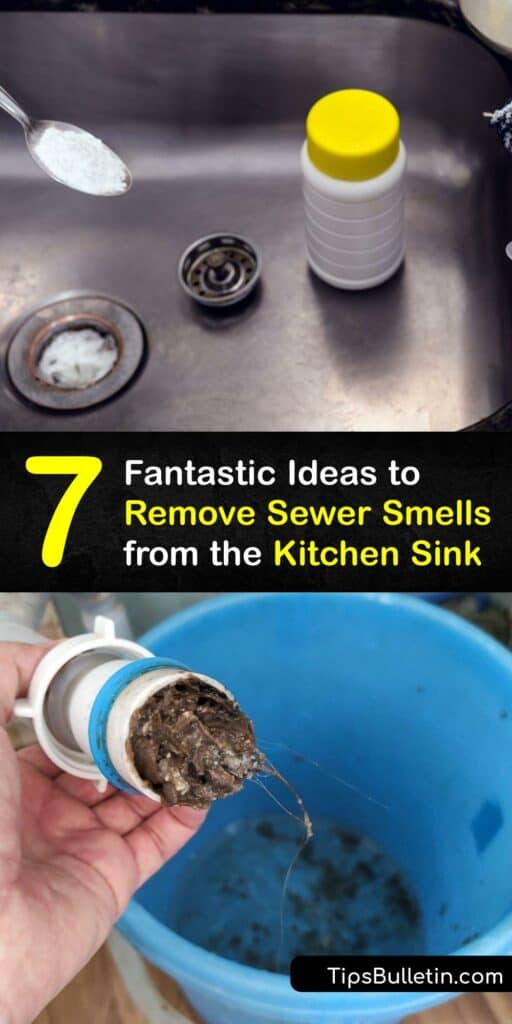A sewer smell in the kitchen sink is off-putting and embarrassing. The stench of sewage wafting from the space where you prepare food makes you seem unclean and unhygienic and might kill your family’s appetite. Fortunately, learning how to get rid of smelly drains in a kitchen is straightforward.
Begin by identifying possible causes of the smell as these help determine the solutions. It’s wise to note what kind of smell you’re dealing with. Is it sewer gas, rotting food, musty, or bacterial? Determine where the smell comes from to narrow the possible issues.
While having a stinky sink is not fun, many homeowners face this problem at some point. The nature of the kitchen sink and the high levels of moisture and waste make it a prime target for developing foul odors, no matter how often you clean.

- How to Get Rid of Smelly Drains in a Kitchen
- Odor Causing Bacteria Make a Sewer Smell in the Kitchen Sink
- Check for a Blocked Drain Vent If the Kitchen Sink Smells Like Sewage
- Mold May be Why Your Kitchen Sink Drain Smells Bad
- A Dirty Garbage Disposal Creates Kitchen Sink Smell
- Fix a Sewer Smell Under the Kitchen Sink
- Trapped Items Cause Stinky Drains in the Kitchen
- Is Your Kitchen Sink Odor from the Water Heater?
How to Get Rid of Smelly Drains in a Kitchen
When your daily maintenance fails and an awful stench develops in your kitchen, don’t panic. Explore ideas to fix a sewer smell under the kitchen sink and quickly take care of the issue to restore your home to freshness.
When you experience a sewer smell in the kitchen sink, it’s vital to know what you should look for and follow our ways to make drains smell better. Odors like sewage, rotting food, and bacteria smell unpleasant. Find out how to fix a sewer smell under the kitchen sink to ensure your kitchen stays clean, fresh, and inviting.
Odor Causing Bacteria Make a Sewer Smell in the Kitchen Sink
Thanks to the nature of your kitchen sink and attached drain pipe, it often becomes a target for bacteria. Food residue and moisture combine to make an inviting environment for bacterial growth, and this bacteria emits an unpleasant odor and makes your kitchen an uninviting space.

Thorough drain cleaning with potent products like distilled white vinegar and baking soda eradicate these bacteria and their smell.
Pour the powder down the drain, follow it with the vinegar, and let them stay in the drain for ten minutes. These ingredients react and fizz to remove food accumulation and bacteria. Pour the boiling water down the pipe to remove the dirt and kill lingering microbes in your drain.
To ensure you don’t start having issues with dishwasher smells, clean your dishwasher drain with white vinegar. Pour a cupful into the drain, let it sit for 15 minutes or so and run the dishwasher without items inside.
Check for a Blocked Drain Vent If the Kitchen Sink Smells Like Sewage
The sewage smell in your sink might originate from a blocked drain trap, similar to what happens with smelly basement drains. If your sink isn’t draining as expected and has an unpleasant stench, a stopped-up plumbing vent might be to blame. When the drain vent pipe is obstructed, the gasses usually expelled from your lines build up and back up into your home.
Blocked vents occur more commonly after a period of little or no use. If you’re returning from vacation or moving into a previously unoccupied residence, this and a bad smell indicate a vent may be the problem. A reputable plumbing service can unclog the duct and ensure your system works effectively.
Mold May be Why Your Kitchen Sink Drain Smells Bad
The type of drain smell you’re experiencing from your kitchen sink helps to identify what might be responsible for it. A musty smell usually points to mold in your kitchen drain. Pour boiling water down the plughole twice daily to clean smelly drains and destroy the mold spores responsible for the bad smell.
To prevent unwanted odor in the future, keep your sink clean, avoid putting food scraps down the drain and treat with boiling hot water daily to slow mold build-up.
A Dirty Garbage Disposal Creates Kitchen Sink Smell
If your kitchen sink has a foul odor, your garbage disposal may be the culprit. Food builds up in the blades and the pipes over time, and you end up with a stinky drain as it rots. Fortunately, it’s relatively straightforward to use a mild abrasive cleaner to clear your garbage disposal of food debris and keep sewer smell out of your house from this culprit.
To clear the smell and make a simple drain odor eliminator, combine the ice, salt, and lemon juice in a large bowl or jug, and run it through your garbage disposal as you would with waste. Once you use all the mixture, rinse your disposal with cold water for at least 30 seconds. Repeat if the drain odor persists.
As a bonus, this treatment smells fabulous. It will also kill sink gnats if you have spotted a few.
Fix a Sewer Smell Under the Kitchen Sink
If any part of the plumbing surrounding your kitchen sink is defective or leaking, you may smell sewer gasses in your home. When the drain trap or a pipe leaks, sewer gas usually transported away floats into your kitchen.
When you smell sewer gas from your kitchen sink, reach out to a plumbing service. Professional plumbers check for leaks or defects and ensure your lines are working correctly to remove gasses from your house to avoid a foul odor.
Trapped Items Cause Stinky Drains in the Kitchen
The cause of your smelly drain might be simpler than you realize. Too often, while using the sink to prepare food or wash up, items fall into the drain without us realizing it. Things like large bones or utensils sit inside the garbage disposal or drain pipe and catch other debris to make a harbor of stinky, smelly mess below the plug hole.
If you have a garbage disposal, start by turning it off at the wall. Never reach into the garbage disposal without being sure the power is off. Use a flashlight or headlamp to look down into the drain and carefully remove visible foreign objects. Use a drain cleaning technique after removal to ensure your sink is clean and ready for use.
Is Your Kitchen Sink Odor from the Water Heater?
While a sewer smell from the faucets in the kitchen may not immediately make you think of water heater repair, this could be the solution. When hot water stays in your water heater tank too long, it facilitates the growth of sulfate bacteria.
These odor-causing bacteria are more likely to create an unpleasant smell if you have well water that isn’t adequately treated before entering the system.
If the water itself, rather than the drain, or vent, is carrying the pungent smell, your water heater is number one on the list of suspects for the cause. Find a local professional who conducts water heater repair to treat your water heater’s tank with an antibacterial such as chlorine, and investigate why the tank is holding hot water longer than desired.
It’s a good idea to stop drinking water from the faucets and to take other precautions until your tank is inspected by a professional.
Where you have sewer odor or another unpleasant odor, a smelly kitchen sink makes your kitchen seem unclean and unhygienic and an unpleasant place to cook. After you rule out other sources of the stench, such as mold in your air conditioning system, it’s time for simple observations to identify the smell’s origin and treat it.
As the kitchen is a food preparation space, cleanliness is paramount. Use simple home remedies to eradicate the sink smell and ensure your kitchen is a safe place for you and your family.

If you loved this article on sewer smell in the kitchen sink, please share this brilliant information on how to get rid of smelly drains in a kitchen on Facebook and Pinterest with your friends and family.